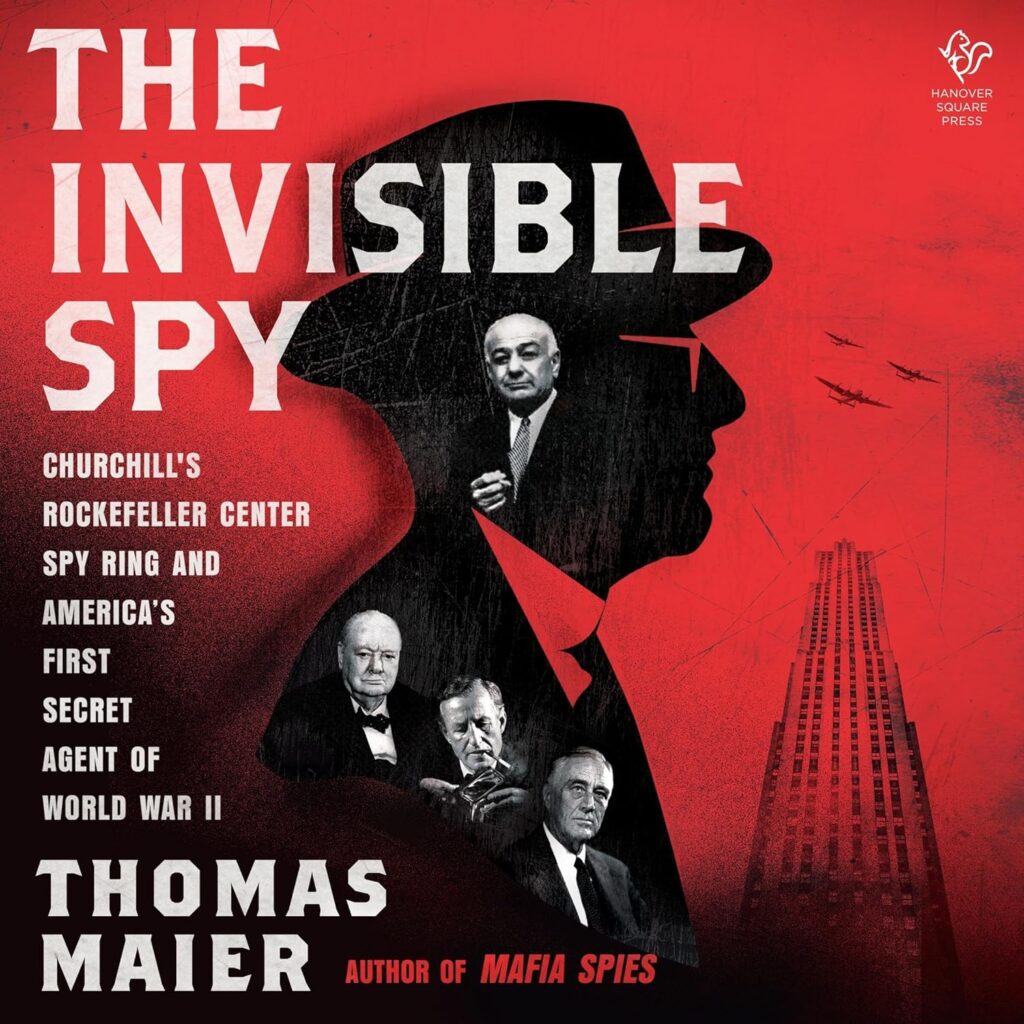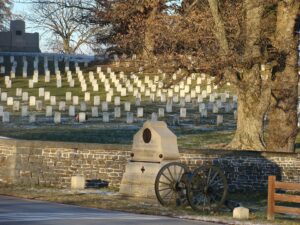Bulletin #205 — Jun 2025
Spy Games

May 31, 2025
Thomas Maier, The Invisible Spy: Churchill’s Rockefeller Center Spy Ring and America’s First Secret Agent of World War II, Hanover Square Press, 2025, 470 pages, £25.00/$32.99. ISBN 978–1335000606
Review by W. Mark Hamilton
As the world celebrates the eightieth anniversary of the conclusion of the Second World War, historian, investigative reporter, and TV producer Thomas Maier reveals a little-known but vital story of the war. This book is not about the war’s generals, admirals, or great battles, but about an Anglo-American spy network established by Winston Churchill in the very heart of New York City. Even though Churchill is not the main focus of the book, he is a commanding presence and ultimately responsible for a significant espionage success.
Maier’s primary figure is Ernest Cuneo, a first-generation Italian-American born in New Jersey in 1905, who became not only a lawyer and a journalist, but unbeknownst to many until now, America’s first secret agent in the Second World War.
The British and Churchill had a long and historic interest in spying, and its existence during the Second World War was no exception. Soon after becoming prime minister, Churchill established an espionage office in New York City’s Rockefeller Center. The door of this innocuous looking office, Room 3602, was misleadingly labeled “Passport Office.” Great Britain received free rent for the space in return for the hope that Churchill would write a biography of John D. Rockefeller, which he never did.

2025 International Churchill Conference
Cuneo, who thought England was “fighting for its life” and must prevail against Nazi Germany, was in part recruited for his role in US espionage by Canadian spymaster and wealthy businessman William Stephenson. As a liaison between US General William Donovan in the new Office of Strategic Services (OSS) and Churchill’s British spy center in the United States, the British Security Coordination (BSC), Cuneo was part of a network that included film celebrities such as Noёl Coward, Gary Grant, Charlie Chaplin, and many others—and this network was vastly superior to the Germans’ and Russians’ networks.
The British and Cuneo were interested not only in the activities of the strong “America First” and isolationist communities, which opposed any US involvement in the war, but in defanging US-based Nazi sympathizers. Cuneo’s second wife, Canadian Margaret Watson, who was also a Churchill agent at Rockefeller Center, was once nearly smothered to death by a Nazi assassin. Cuneo had both a physical and mental toughness. He had gained his physical strength from playing football professionally in addition to having played at Columbia University, where he also developed his powers of strategic thinking by earning a law degree despite having been a rather lazy student.
Cuneo parlayed his considerable social skills into valuable friendships with politicians such as New York’s Fiorello La Guardia and newspaper journalist Drew Pearson, eventually becoming a salaried legal aide to popular radio commentator Walter Winchell. A very social and likeable person, Cuneo was a regular figure at New York’s famous Stork Club, a prestigious Manhattan nightclub where rich and influential people met to socialize and gossip. Unbeknownst to them, Cuneo attended not merely to rub shoulders with the well-connected glitterati, but to be a listening post that enabled him to gather useful information on factions and people for and against US participation in the war.
Both President Franklin Roosevelt and FBI Director J. Edgar Hoover were aware of Churchill’s activities, and Roosevelt, upon American entry in the war, dispatched William Donovan to London to meet with Churchill. Donovan reported back to Roosevelt with a most positive view of Churchill and his capabilities to deliver on his war efforts, including plans to thwart the Germans’ extensive spying in the world, which was being funded by Hitler to the tune of what was then close to $200 million. As Roosevelt became increasingly worried about the Nazi threat, he directed more funds to the FBI and Hoover, who was very jealous of Donovan’s power and connections as well as of the OSS, which eventually became the Central Intelligence Agency. The FBI had been around twenty years when the war broke out, and Hoover resented what he saw as encroachments on his power.
Cuneo well understood the power of German propaganda in successfully delaying the United States’ entry into the war. In what he referred to as “combat journalism,” he continued to develop his press and media skills, working closely with American newspaper columnist and radio commentators Walter Winchell and Drew Pearson to slant the news with a pro-British bias. Churchill’s literary agent, Emery Reves, worked hard to get the prime minister’s writing planted in the US media with the support of Henry Luce, who headed the powerful publisher Time Inc. Both Churchill and Cuneo also understood the propaganda value of cinema and looked to British film director Alexander Korda and Hollywood for guidance on influencing public opinion about the war through movies and newsreels.
In December 1941, Churchill, through his New York operations, established a spy training center called “Camp X” on the Canadian shore of Lake Ontario. With the US now in the war, Churchill proclaimed it was time for “ungentlemanly war.” Maier attributes Cuneo’s friendship with British spy Ian Fleming as having influenced Fleming’s James Bond novels, noting that several of Cuneo’s spying devices developed at Camp X appeared after the war in Fleming’s books, one of which, Thunderball, he dedicated to Cuneo.
It was on a trip to London in 1943, accompanied by William Stephenson, that Cuneo finally met Churchill at No. 10 Downing Street. The event took place in the middle of the night, lending it a cloak-and-dagger atmosphere, but there was nothing mysterious about the meeting. Though Cuneo was concerned about the late hour, Churchill was not, appearing in his famous “siren suit” for a brief conversation and nightcap with Cuneo.
The end of the war returned Cuneo to an existence that was much calmer, and, he felt, more boring. London closed the Rockefeller offices, but the important work done there did not go unacknowledged. When Churchill awarded Stephenson a knighthood, he wrote, “This one is dear to my heart,” according to Maier. As the excitement of wartime ended, Cuneo’s relationships with Winchell and Pearson faded, but he maintained his friendship with Fleming, who turned from spy work to espionage novels.
Maier has contributed a fascinating and informational book to the field of Churchill studies. Readers not aware of Churchill’s lifelong interest in espionage will enjoy learning something about it and reading many exciting anecdotes. Well-researched and hard to put down, the book reads like a novel, but it is factual, and its claims are supported by evidence. Thanks to Maier, Ernest Cuneo is no longer an “invisible spy,” and yet another side of Churchill has been revealed.
W. Mark Hamilton is author of The Nation and the Navy: Methods and Organization of British Navalist Propaganda, 1889–1914 (1986).
Subscribe
WANT MORE?
Get the Churchill Bulletin delivered to your inbox once a month.






